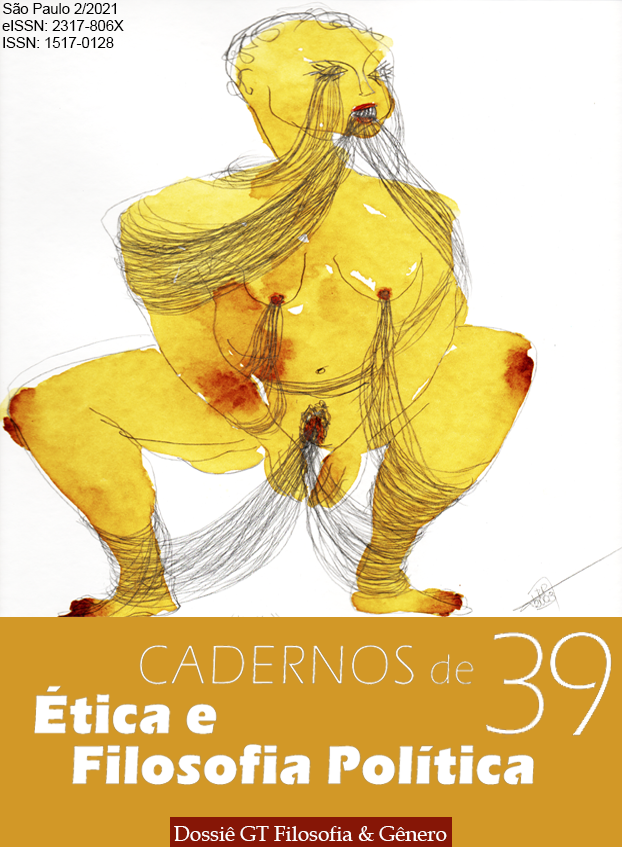Razão à sombra do sexismo: o feminino no pensamento de Sêneca
DOI:
https://doi.org/10.11606/issn.1517-0128.v39i2p177-189Palabras clave:
Mulheres, Racionalidade, Estoicismo, Sêneca, SexismoResumen
Neste artigo será abordada a ambígua e, por vezes, contraditória representação das mulheres no pensamento do filósofo estoico Sêneca. Com isso, pretende-se demonstrar que a construção da postura misógina no âmbito da filosofia se dá, primeiramente, desde a antiguidade e, muitas vezes, de modo conflituoso com os próprios pressupostos e princípios professados pelas diversas correntes de pensamento. No caso específico deste texto, pretendemos demonstrar como Sêneca, declarado filósofo estoico, apresenta o gênero feminino de modo pejorativo e, como veremos, com discutível respaldo no conjunto dos princípios da filosofia do pórtico. Ao acompanhar as reflexões do pensador romano sobre o gênero feminino percebemos que há uma dupla apresentação das mulheres. Em algumas passagens, o filósofo as expõe como virtuosas e, portanto, dignas da atividade filosófica e da realização de ações corretas. Por outro lado, e na maior parte das vezes, o autor latino confere ao gênero feminino características que indicam limitações e podem prejudicar seu comportamento ético, mitigando assim o exercício pleno de sua racionalidade. Por muitas vezes, vemos Sêneca associar aos adjetivos femininos falhas morais e deficiências de caráter, ao passo que, aos adjetivos masculinos, o filósofo creditará ações virtuosas e ligadas à racionalidade. No entanto, como compreender tal ambiguidade em relação ao gênero feminino se, por princípio, o pensamento estoico afirma que a potencialidade de realização de ações virtuosas é garantida à humanidade, graças a sua participação na razão universal?
Descargas
Referencias
A.A. LONG & D. N. SEDLEY. Les philosophes hellénistiques. Vol. II. Les Stoïciens. Paris: Flammarion, 2001.
AIKIN, S. e MC-GILL-RUTHERFORD, E. “Stoicism, Feminism and Autonomy”. In: Symposion, 1, I. (2014). pp. 9-22.
ARNIM, Hans Von. Stoici antichi, tutti i frammenti. Introduzione, traduzione, note e apparati a cura di Roberto Radice; presentazione di Giovanni Reale. Milano: Bompiani, 2002.
DIÔGENES LAÊRTIOS. Vida e doutrina dos filósofos ilustres. Tradução do Grego de Mário da Gama Kury. Brasília: Editora Universidade de Brasília, 2008
FAVEZ, C. “Les opinions de Sénèque sur la femme”. In: REL (Révue des Etudes Latines), 1938. pp. 335-345.
GRAHN-WILDER, Malin. Gender and Sexuality in Stoic Philosophy. New York: Palgrave Macmillan, 2018
LAURAND, V. Le vocabulaire des stoïciens. Ed. Ellipses. Paris : 2002.
LAURAND, V. La politique Stoïcienne. Paris : PUF, 2005.
MANNING, C. E. “Seneca and the stoics on the equality of the sexes”. In: Mnemosyne. Vol. 26, Fasc. 2 (1973). Pp. 170-177
MÜLLER, R. Les Stoïciens: La liberté et l’ordre du monde. VRIN. Paris: 2006.
PIMENTEL, Maria Cristina. "Aliquando sexum egressa (Tac. Ann. 16.10): quando a mulher transcende a fraqueza do seu sexo” in Cristina Santos Pinheiro, Anna Martina Emonts, Maria da Glória Franco, Maria João Beja (coords.), Mulheres: Feminino, Plural. Funchal: Nova Delphi, 2013. pp. 15-36.
PIMENTEL, Maria Cristina. "Estoicismo e figuras femininas em Séneca". In: Brotéria, 158 (2004). pp. 251-268.
RADICE, Roberto. "Oikeiosis": ricerche sul fondamento del pensiero stoico e sulla sua genesi. Milano: Ed. Vita e Pensiero, 2000
SÊNECA. Cartas à Lucílio. Tradução, prefácio e notas de J. A. Segurado e Campos. 4ª Edição. Lisboa: Fundação Calouste Gulbenkian, 2009.
SÊNECA. Cartas Consolatórias (Consolatio ad Marciam; Consolatio ad Helviam ; Consolatio ad Polybium). Tradução de Cleonice Furtado Mendonça Van Raij. Campinas: Pontes, 1992.
SÊNECA. Sobre a brevidade da vida; Sobre a Firmeza do Sábio. (De Brevitate Vitae; De Constantia Sapientis). Tradução de José Eduardo S. Lohner. São Paulo: Penguin Classics Companhia das Letras, 2017.
SÊNECA. Sobre a Ira; Sobre a tranquilidade da alma. (De Ira; De Tranquilitate Animi). Tradução de José Eduardo S. Lohner. São Paulo: Penguin Classics Companhia das Letras, 2014.
SÊNECA. Sobre a tranquilidade da alma /Sobre o Ócio. Tradução, notas e apresentação de José Rodrigues Seabra Filho. Ed. Bilíngue. São Paulo: Nova Alexandria, 2001.
SÊNECA. Tratado sobre a clemência (De Clementia). Tradução, introdução e notas de Ingeborg Braren. Petrópolis: Editora Vozes, 1990.
TÁCITO. Anais. Tradução e prólogo de Leopoldo Pereira. Ediouro, 1967.
TITO LIVIO. História de Roma. (Ad Urbe Condita Libri). São Paulo: Paumape, 1989.
VEYNE, P. “L’homossexualité à Rome”, In: Communications, 35, 1982. Sexualités occidentales. Contribution à l’histoire et à la sociologie de la sexualité. pp. 26-30.
VOELKE, A.-J. L’idée de volonté dans le stoïcisme. Paris: PUF, 1973.
Descargas
Publicado
Número
Sección
Licencia
Derechos de autor 2021 Taynam Santos Luz Bueno

Esta obra está bajo una licencia internacional Creative Commons Atribución-CompartirIgual 4.0.


